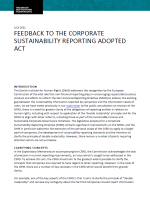
Feedback to the Corporate Sustainability Reporting adopted act
In July 2021 the Danish Institute for Human Rights provided feedback to the Corporate Sustainability Reporting Directive Proposal published by the European Commission in April 2021.
The Danish Institute for Human Rights (the Institute) welcomes the recognition by the European Commission of the vital role that non-financial reporting plays in encouraging responsible business conduct and efforts to reform the Non-Financial Reporting Directive (NFRD) to address the existing gap between the sustainability information reported by companies and the information needs of users.
As the Institute noted previously in our submission to the public consultation on revision of the NFRD, there is a need for greater clarity of the obligations of reporting entities in relation to human rights, including with respect to application of the ‘double materiality’ principle and for the NFRD to align with other reforms, including those as part of the Sustainable Finance and Sustainable Corporate Governance Initiatives.
The legislative proposal for a Corporate Sustainability Reporting Directive (CSRD) contains significant improvements on the NFRD, and the Institute in particular welcomes the extension of the personal scope of the CSRD to apply to a larger pool of companies, the development of sustainability reporting standards and the intention to clarify the principle of double materiality. However, there remain a number of points requiring attention:
- the double materiality requirement may not be immediately clear to reporting undertakings and would benefit from greater clarity, specifying that an undertaking should report on how it impacts on the enjoyment of the human rights of rightsholders and on the planet;
- there is a need for regulatory alignment, in particular with the reforms currently under consideration under the Sustainable Finance and Sustainable Corporate Governance Initiatives;
- Under the Proposal, human rights are considered as a subset of “social” and are considered separately from equal opportunity and certain issues related to labour which carries the risk of conceptual confusion which may drive reporting on ‘social impact contributions’ rather than on respect for human rights. Equal opportunities, working conditions and other areas that the EU wishes to highlight should be considered as part of an overarching obligation to reporting on the undertaking’s human rights impacts; and
- For large corporate groups with subsidiaries in numerous countries covering different business segments and activities there is a risk that aggregate reporting at the group level will not deliver meaningful disclosure. The proposal and subsequent standards should clarify that group level reporting shall include information necessary to understand the undertaking’s impacts on sustainability matters, including the impacts of subsidiaries.
We strive to make the pdf versions of our publications etc. accessible for screen readers. If you experience any problems, please contact Digital Editor Stine Juhl Nielsen on stni@humanrights.dk
